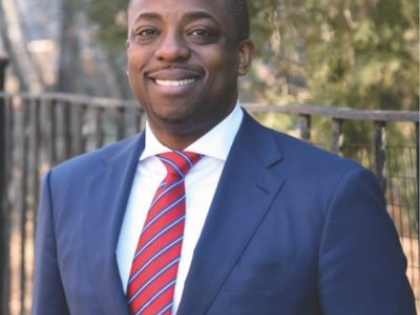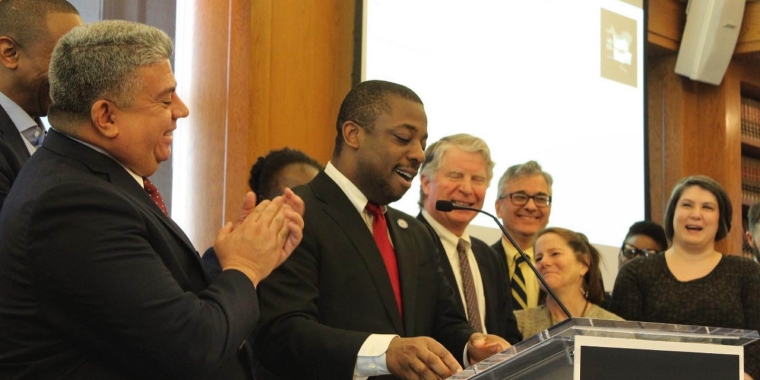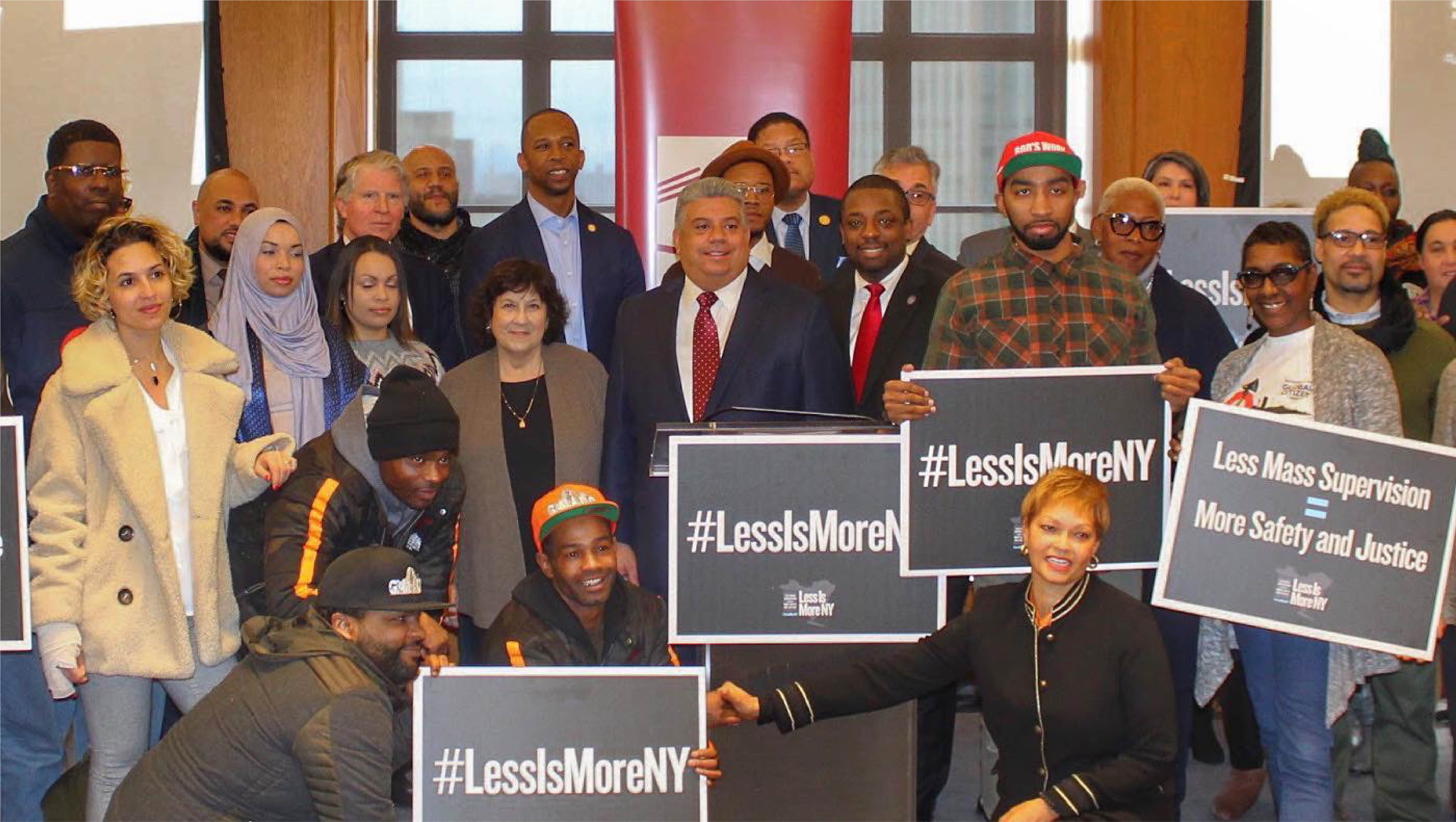
Senator Benjamin and Advocates Announce Legislation to Reform New York’s Broken Parole System
Contact: Neil D. Reilly, 774.766.2351
February 7, 2019
-
ISSUE:
- Criminal Justice Reform
- Parole

(New York, NY) As momentum builds for criminal justice reform in New York State, State Senator Brian A. Benjamin, Assemblyman Walter Mosley, and a unique coalition of New York community groups, reformers, directly impacted people, and prosecutors, convened in support of the Less Is More: Community Supervision Revocation Reform Act (S.1343A—Benjamin/Assm. Same-As # pending, Mosley).
Under current law, New Yorkers on parole can be re-incarcerated for non-criminal technical violations of parole like being late for curfew. These New Yorkers are sent back to jail for months or even years, costing the taxpayer money without providing any public safety benefit. With a growing population of 720 New Yorkers incarcerated for technical violations on Rikers Island alone, New York leads the nation (second only to Illinois) in these incarcerations. The Less is More Act will change that.
On any given day, the number of New Yorkers in state jails because of technical violations of their parole is over 6,000, more than 12% of the total prison population. On Rikers Island, the only group that is increasing is New Yorkers jailed for a technical violation of their parole, with more than 700 people jailed there today. If we are serious about ending mass incarceration, we shouldn’t be locking people up for a speeding ticket or being late for curfew. It speaks volumes that a coalition of people who make laws, enforce laws, and have been affected by these laws all support this legislation, ” said Bill Sponsor New York State Senator Brian A. Benjamin
Bill Sponsor New York Assemblyman Walter Mosley, said: "We are sending a message today that Less is More has support and that support is growing. It's time to reform our parole system and move forward with something that is fair and more effective. That's what this act does and that's why we need to pass it in the legislature. I want to thank Brooklyn District Attorney Eric Gonzalez for his support of this legislation and for his work on reforming our criminal justice system."

New York Senator Jamaal Bailey, said: “The Less is More Act introduced by Senator Benjamin and Assemblymember Mosley, is necessary and desperately needed. Individuals who have served their time and are out on parole should have the opportunity to live their lives as productive members of society. As it currently stands, parolees can be incarcerated for technical violations, that in some cases may be beyond their control. This is not the answer to rehabilitation and is leading to more mass incarceration.”
Brooklyn District Attorney Eric Gonzalez, said: “In Brooklyn, we have taken significant steps to reduce our reliance on incarceration, including a new bail policy that decreased pre-trial detentions on misdemeanors by nearly 60%. But the reality is that approximately one-third of new admissions to New York prisons are due to technical parole violations and the post-release supervision system has ballooned in our state far beyond its original purpose. That is why I strongly support the Less Is More Act and commend the lawmakers and advocates who are pushing for this important reform. The bill’s approach complements the one my office is taking: focusing resources on dangerous individuals and minimizing interventions against those who commit minor infractions to allow them the opportunity to successfully integrate into our communities.”
Manhattan District Attorney Cyrus Vance, Jr., said: “Parole is supposed to be a less punitive and more rehabilitative alternative to incarceration, but in reality, technical parole violations are a significant driver of unnecessary incarceration in New York. Today, New York State is sending people back to prison for things that prosecutors no longer prosecute, and for things that are not even crimes. I thank Assembly Member Mosely, Senator Benjamin, the Katal Center, and the Columbia Justice Lab for their work on this forward-looking, evidence-based overhaul of our parole system, and I urge New York lawmakers to enact it now.”
Bronx District Attorney Darcel D. Clark, said: “With the Bronx County Reentry Task Force, we are helping those released from prison navigate back to their communities with the resources they need to be productive. They should not be derailed from getting their lives back on track by a minor, technical violation of parole landing them behind bars again. The Less Is More Act is a sensible reform.”
Judge Jonathan Lippman, former NYS Chief Judge, of Counsel in the New York office of Latham & Watkins LLP, and President of the Historical Society of the NY Courts, said: “New York’s parole system was intended to help people succeed when they leave prison, but it has become a revolving door back to incarceration. Each year, thousands of people are sent to prison not for new criminal convictions, but for non-criminal “technical” violations of parole like missing an appointment or failing a drug test. These technical violations are also a serious obstacle to closing the dysfunctional Rikers Island jail complex, because almost 20 percent of the people held on Rikers are jailed for parole reasons. The Less Is More Act is a bold rethinking of New York’s broken parole system. It will help people return to their communities with success, save taxpayer money, and dramatically reduce incarceration for parole violations, bringing us even closer to the day we can end the profound damage that Rikers wreaks on our City.”
Donna Hylton, Director of the Women and Girl’s Project at the Katal Center for Health, Equity, and Justice, who was formerly incarcerated for 27 years, said: "New York State is known to be a progressive leader in criminal justice reform, a leading voice in the fight for basic human dignity, and a strong supporter of ‘second chances.’ Yet our parole system is sending so many people back to jail and prison for simple technical violations. It now has the terrible distinction of being a national leader in re-incarcerating people who are on parole. Sending people back to jail and prison for simple technical parole violations is deeply flawed and undermines the reentry process. Unfortunately, Black and Brown people are more likely to be re-incarcerated for a technical violation than are white people, and we all know that's not right. As a formerly incarcerated person who spent 5 years under parole supervision, I know what it's like to be afraid that after years of being incarcerated, I could be doing everything right, but a basic misstep like being late to a meeting might send me back to prison. Thankfully, we can fix this. The Less is More Act represents a great start for New York to be the beacon of progressive reform and ‘second chances’ it purports to be. We are proud to stand with Senator Benjamin and Assemblyman Mosley in support of this bill, and invite others to join us in the Less is More campaign to win real reform and strengthen our communities."
Derek Singletary, Co-Founder and Co-Executive Director of Unchained, who has previously been on parole said: “This bill will not only overhaul the system of community supervision and revocations, but also has the potential to transform the mentality of individuals on parole. When the threshold for returning to jail is so low because parole re-incarcerates people for minor technical violations, hopelessness can set in. The Less is More bill will not only ensure the physical freedom of thousands of people by not sending them to jail for things that are not crimes, but will also give them the mental freedom to live their lives without the threat of a violation constantly hanging over their heads. By introducing an incentive to be discharged from supervision early, this bill creates a much more positive and effective approach to supporting individuals in reintegrating into communities successfully.”
The new legislation follows the recommendations of the “Less is More in New York” report released earlier this year by the Justice Lab at Columbia University. While New York City jail populations have dipped below 9,000 for the first time in 35 years, New Yorkers in city jails for state parole violations have increased by 15 percent. New York re-incarcerates more people on parole for technical violations – a missed appointment, broken curfew, or positive test for alcohol – than any state in the country except Illinois. Of people on parole whom New York sent back to prison in 2016, over 65 percent were re-incarcerated for technical parole violations. According to a report by the Columbia University Justice Lab, for every 10 people who successfully complete parole in New York, nine fail.
Vincent Schiraldi, Co-Director of the Columbia University Justice Lab, Author of the Less Is More report, and former New York City Probation Commissioner, said: “New York State has the second highest number of people being returned to prison for crimeless parole violations in the country, and people locked up at Rikers Island for crimeless violations are the only increasing population there. Parole, which started as a way to help people adjust to their communities after imprisonment, has become a major contributor to mass incarceration and the stark racial disparities that go along with it. Assemblymember Walter Mosley and Senator Brian Benjamin should be applauded for sponsoring the Less Is More Act, which could very well be the most forward-thinking legislation in the country addressing parole violations.”
JeanNaneTaye Rowell, Katal member in Albany, New York, said: "As a single mother of a 10-year-old whose father has been ripped from her life time and time again for violating the terms of his community supervision, I am ecstatic that there is finally some hope for my daughter to have a chance to have her father be a part of her life again due to the Less Is More Act! As a mother, it breaks my heart having to explain to her that her Dad is not a bad person because he is incarcerated, and unable to come to the events that little girls her age dream of having her "hero" there, especially not having committed another crime but due to strict and often-times unmanageable conditions. The Less Is More Act gives us renewed hope and a sense that someone understands."
Curtis Bell, Katal member in Brooklyn, New York, who was formerly incarcerated for 18 years, said: “Citizens on parole have longed for shelter within the sanctuary of justice; it has been denied. As a result, we as a State have denied citizens the right to defend themselves in relation to the world they inhabit. In essence, without reform to the parole system like the Less Is More bill, citizens can’t actualize democracy.”
Sheriff Craig D. Apple of Albany County, said: “I believe we need to take a common sense approach to this issue. When you are dealing with human beings with different backgrounds and a variety of other contributing factors, I think it is wrong to apply a uniform harsh standard. In Albany County, we have recognized the positive impact that incentives and diversionary services can have on changing lives. The Less Is More Act addresses these areas and in the case of a violation, protects the rights of due process and speedy hearings, and I am in support of the Less Is More Act to help reform the New York State Parole system.”
Rob DeLeon, Associate Vice President of Programs at The Fortune Society, said: “New York State ranks second in the country at incarcerating the most people on parole for technical violations, and at a rate nearly five times the national average. This stems from our current supervision policies allowing too many pathways to re-incarceration based on a parole officer’s subjective perspective. Like many of our clients at The Fortune Society, I experienced the trauma that comes from being incarcerated, struggled to overcome barriers during reentry, felt the anxiety of being on supervision for four long years, and am now a positive influence in my community. I believe the Less is More Act is a positive step in reshaping parole laws to help people succeed after incarceration.”
DeAnna Hoskins, President and CEO of JustLeadershipUSA, said: “Here in New York State, and across the country, parole has become a revolving door to incarceration, especially for Black and brown people. As directly impacted people working to cut the US correctional population in half by 2030, we are committed to shrinking the number of people on parole and probation and to ending the reliance on those archaic systems. We are working tirelessly to #CLOSErikers and decarcerate jails across the state, and that requires ending the impact of parole as a driver of incarceration. The Less Is More legislation introduced by Sen. Brian Benjamin and Assemblyman Walter Mosley is a strong start to that process. This bill will limit the length of parole, cut down on the way that parole fuels incarceration, and help ensure that parole serves as a pathway out of the criminal legal system, and not an extension of it. We know we can make this bill even stronger by ensuring that all of the cost-savings it generates are invested back into our communities to support the people who have been most harmed by parole and the criminal legal system. We look forward to working with Sen. Benjamin, Katal, and others in making that happen.”
Lorraine McEvilley, Director of Legal Aid Society’s Parole Revocation Defense Unit, said: “As the only institutional provider in the city that represents individuals accused of violating conditions of their parole, we welcome the introduction of the Less is More Act and urge the legislature to pass the bill this session. Every day, countless numbers of people are hauled into Rikers Island for indefinite periods of time, to face allegations of wrongdoing that do not amount to criminal activity. While those people languish in jail for months waiting for a hearing, all of the strides they’ve made in the community such as gaining housing or employment are lost. This bill will ensure that people on parole will not be re-incarcerated for minor technical violations, and that any period of incarceration that results from other violations is severely capped. The day has come for community supervision to be restored to its original goal of helping people successfully reintegrate into society, not serve as a main driver of mass incarceration.”
Pastor Isaac Scott, A.A.S., Justice in Education Scholar at Columbia University, said: “I want to publicly announce my support for the Less Is More bill. Having personally completed a total of 7 years of parole supervision in NYS, I am familiar with the many obscure obstacles that men and women on parole face and the very difficult decisions that subsequently have to be made as the threat of re-incarceration is dangled before them, and most times arbitrarily used against them by parole officers. In NYS, parolees are mandated to adhere to very stringent, and most times, unproductive rules and regulations that prevent successful social and economic reintegration for people who've spent years, sometimes decades away in prison. The Less is More bill is a step to opening the prison doors for redemption and trust by allowing every person released from prison in NYS an opportunity to re-enter society without the psychological and physical burdens of walking a tightrope of technicalities to retain their freedom.”
Dr. Vanda Seward, Professor of Criminal Justice at the CUNY Kingsborough Community College, former Director of Statewide Reentry Services, NYS Division of Parole, said: “As the former Statewide Director of Reentry Services for the New York State Department of Corrections and Community Supervision appointed by then Governor David Paterson, I was responsible for ensuring the access and availability of resources for persons under parole supervision in the State of New York. My experience and personal knowledge about the parole revocation process recognizes that there must be other alternatives in place to stop the re-incarceration of people who commit technical violations. The collateral consequences are severe for this already marginalized population. Loss of employment, loss of housing, and most importantly once again disconnecting them from children, loved ones, and community are just some examples of the damage caused by a technical violation. The Less is More: Community Supervision Revocation Reform Act would address this problem. Parole reform is essential to rebuilding family and community capacity.”
Less is More: Community Supervision Revocation Reform Act (S.1343A—Benjamin/Assm. Same-As # pending, Mosley) aims to end the cycle of re-incarceration for technical violations of parole, while promoting safety, justice, and fairness for all New York City residents. Its provisions include:
- Restricting the use of incarceration for technical violations. Incarceration would be eliminated as a sanction for most technical violations. Certain technical violations could still result in jail time, but it would be capped at a maximum of 30 days.
- Providing earned time credits. People under community supervision would be eligible to earn a 30-day “earned time credits” reduction in their community supervision period for every 30-day period in which they do not violate a condition of supervision.
- Bolstering due process. Persons under community supervision shall be afforded a recognizance hearing in a local criminal court before they are detained, pending adjudication of an alleged violation of their conditions of release, whether a technical violation or a new criminal charge is alleged.
- Providing speedy hearings. Persons under community supervision shall be afforded a speedy adjudicatory hearing upon an alleged violation of their conditions of release.
#LessIsMoreNY is a statewide coalition of community groups, service providers, and public safety experts working together to pass the Less Is More: Community Supervision Revocation Reform Act (S.1343A—Benjamin/Assm. Same-As # pending, Mosley). Permitting New Yorkers to earn accelerated discharge off community supervision will responsibly reduce jail and prison populations; support people who are subject to community supervision/parole in the reentry process; promote safety and justice for families and communities; and save taxpayers money. The coalition calls on the Governor and Legislature to pass this bill, capture the savings that will result from reform, and reinvest those savings back into the communities most harmed by mass incarceration and crime.
related legislation
Share this Article or Press Release
Newsroom
Go to NewsroomHonors For Fallen FDNY Lt. Davidson
April 11, 2018

